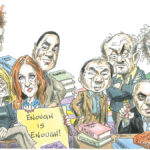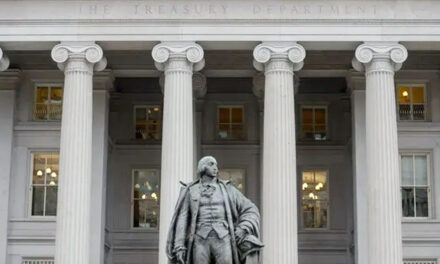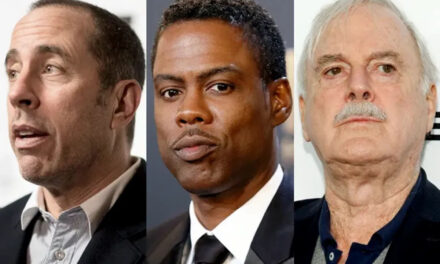
John Lewis … the last great civil rights leader
With the death of Congressman John Lewis, arguably the last of the GREAT and most notable civil rights leaders of the 1960s – with the possible exception of former Atlanta Mayor and former United Nations ambassador Andrew Young — has passed into history.
I emphasized the word “great” because he represented the Martin Luther King-school of social protest. The most often heard word in the movement was “peaceful.” When violence broke out, it was not at the instigation of the King movement, but in the hateful, immoral and illegal response of the governing authorities in the Democrat-run south and major cities.
I also see Lewis as among the greatest civil rights leaders even though I have had significant differences with his political polices as a member of Congress. But I see his courage and peaceful resolve in those turbulent days of protest as the crown of his career. No civil rights leader today faces anything close to the entrenched evil and malevolence as did Lewis and his colleagues. No difference in policy can erase that noble history.
Lewis – and all those who marched philosophically and physically behind King – showed the world a clear demarcation between the injustice being committed against innocent Black Americans on a daily basis and the brutality and horror of the Democrat regimes that segregated, suppressed and summarily killed them for the 100 years since the end of the Civil War.
Lewis was the real thing – unlike the civil rights charlatans who have sold out their people for power, prestige – and most of all – profit. Pseudo- civil rights leaders like millionaires Jesse Jackson and Al Sharpton, who promote racial division in the name of ending it. They are the racial snake oil salesmen who offer a bromide that will do nothing to cure the malady – but will only assure future sales. They see racism in America through a stridently partisan lens – and ironically, profit as sycophants of the very political Party most responsible for the historic plight of Black Americans.
When King and Lewis called for and lived the ideals of peaceful protest, they did so at a time of enormous peril to their own reputations, fortunes and even lives. They peacefully faced-down the most vicious political structures and institutions since the Civil War. They were victimized by complete violations of law, civil rights and the Constitution in those institutionally racist governments in the south and big cities. Many died under the rule of the Ku Klux Klan and the fight to end oppression.
As the media eulogizes Lewis, his words from then and now are quoted. But more often than not his full sentiments are not reflected. We hear of his calls for action on the liberal media, but nothing of his appeals for peaceful demonstrations – and his calling out those who undermine the message with a rampage of violence and criminality carried out by Blacks and Whites in the name of civil justice.
Lewis called out the promoting of violence within the movement in the 1960s – and he called them out in the most recent days of civil unrest. But those words are not heard on the news because they do not fit today’s narrative that even violence is justifiable.
Lewis and King well understood that to achieve civil justice, they had to clearly show the difference between the peaceful protests of a wronged people and the evil of those perpetrating the injustice. That is what all Americans could see in the 1960s. Those who loot, rob, pillage and burn – and even use vigilante tactics to vandalize, graffiti and topple statues – create a false equivalency between social justice and criminality.
Both Lewis and Young have stayed true to the successful King model of civil protest. They knew it was better to recruit people to the cause than to repel people with counter-violence. Unfortunately, too many of the contemporary civil rights leaders have chosen the low road – by encouraging, supporting, rationalizing and promoting civil violence.
Within the modern civil right movement are those who say, “silence is not an option” and “silence is consent.” But when they are silent against violence, they are violating their own adages.
It is highly probable that the infamous Edmund Pettus Bridge in Selma, Alabama will be re-named in honor of Lewis – a most fitting memorial in many ways. The current name celebrates the evil side of what happened on that bridge on March 7, 1965. Regardless of the name, that bridge will stand out as one of the greatest symbols of the quest for equal rights for Blacks. And if the Pettus name drops off the radar of history, it is no loss.
Frankly, I often wondered why so many successive generations of Democrat leaders in Selma never made such a change. It is sad, that the bridge was not re-named at a time when Lewis could have seen the honor. It would have been a poignant last chapter in the life of one of the last truly GREAT civil rights leaders.
So. There ‘tis.



























Lewis was just another Marxist. Sure, he’s to be praised for his civil rights work. But when the democrats became commiecrats he was right up in the middle of it. He became just another political hack. Good riddance.
As I mentioned. My strong disagreements with his political career to not eradicate the honorable and courageous work he did on behalf of peaceful protest. He was a left-winger, to be sure — but was never in league with the violent protesters of today.
Glad we found your page
Joe&Cookie from the block